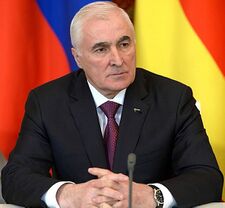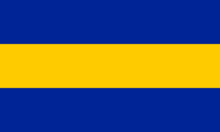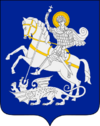Medovia: Difference between revisions
No edit summary |
|||
| Line 184: | Line 184: | ||
| /ɑ/ || /b/ || /ts/ || /tʃ/ || /d/ || /ɛ/ || /ə/ || /f/ || /ɡ/ || /h/ || /i/ || /j/ || /k/ || /l/ | | /ɑ/ || /b/ || /ts/ || /tʃ/ || /d/ || /ɛ/ || /ə/ || /f/ || /ɡ/ || /h/ || /i/ || /j/ || /k/ || /l/ | ||
|- | |- | ||
| '''M m''' || '''N n''' || '''O o''' || '''P p''' || '''R r''' ||''' | | '''M m''' || '''N n''' || '''O o''' || '''P p''' || '''R r''' ||'''Rr rr''' || '''S s''' || '''Ś ś''' || '''T t''' || '''U u''' || '''V v''' || '''X x'''||'''Z z''' || '''Ź ź''' | ||
|- | |- | ||
|/m/ || /n/ || /ɔ/ || /p/ || /r/ || /ʁ/ || /s/ || /ʃ/ || /t/ || /u/ || /v/ || /dz/ || /z/ || /ʒ/ | |/m/ || /n/ || /ɔ/ || /p/ || /r/ || /ʁ/ || /s/ || /ʃ/ || /t/ || /u/ || /v/ || /dz/ || /z/ || /ʒ/ | ||
Revision as of 17:27, 27 March 2020
Republic of Medovia Medovasi Rëspublika (Medovian) | |
|---|---|
| Motto: "Deosam rekin, ćue pragër sen maŕlisem" "With God, all things are possible" | |
| Anthem: Mil Hameltik! My Homeland! | |
| Capital and largest city | Gavarnik |
| Official languages | Medovian |
| Ethnic groups | 94% Medovian 6% Other |
| Demonym(s) | Medovian |
| Government | Unitary Parliamentary Republic |
| Samel Gorgevem | |
| Hakob Beliśavar | |
| Legislature | Parliament of Medovia |
| Independence | |
| Population | |
• 2019 estimate | 17,450,200 |
| GDP (nominal) | 2019 estimate |
• Total | $83.172 billion |
• Per capita | $15,646 |
| HDI (2019) | 0.825 very high |
| Currency | Melat |
| Driving side | right |
Medovia (Medovian: Medova), officially the Republic of Medovia (Medovian: Medovasi Rëspublika), is a country in Anteria.
History
Geography
Politics and Government
Medovia is a parliamentary constitutional republic and sovereign state whose politics operate under a framework laid out in the constitution wherein the president functions as the head of state and the prime minister as the head of government. The sovereignty is vested in the Medovian people and exercised by the Medovian people through their representatives or directly.
The executive power is exercised by the president and prime minister whereby the power of the president is very limited. The Prime Minister is the commander-in-chief of the military and the President is the representative of the unity of the Medovian people. The tenure of the president depends on the confidence of the parliament and is elected for a five-year term by the parliament by a majority of three-fifths of all its members. The prime minister, appointed by the president and approved by the parliament, is authorized to constitute the cabinet. The cabinet is composed primarily of the prime minister inclusively its deputies and ministers.
President
The president of Medovia (Medovian: Medovasi Legëlburu), officially styled President of the Republic of Medovia (Medovian: Medovasi Rëspublikasi Legëlburu) is the head of state and the representative of the unity of the Medovian people.
The president has the power to set the date of the elections for the Parliament as well as referendum, grants pardons and awards and other state awards. In case of incapability to discharge duties of office, the Chairperson of the Parliament assumes the office of acting president until the president resumes duty, or until election of a new president. The Office of the President of Medovia consists of the immediate staff of the president of the country, as well as support staff reporting to the president. The office is seated in the Presidential Office in the capital city Gavarnik.
The president is elected through a secret vote and without debate by the Parliament of Medovia by a majority of three-fifths of all its members and is in every case elected for 5 years. However, the Constitution of Medovia sets a limit to a maximum of two terms in office. The president-elect is required to take an oath of office before the members of the Parliament of Medovia. The President must not belong to any political party.
Prime Minister
The prime minister of Medovia (Medovian: Medovasi Ćjefministër), officially styled Prime Minister of the Republic of Medovia (Medovian: Medovasi Rëspublikasi Ćjefministër), is the head of government of the Republic of Medovia and as well the most powerful and influential person in Medovian politics. The prime minister holds the executive power of the nation, represents the Council of Ministers and chairs its meetings, and also is commander-in-chief of the military.
The prime minister is appointed by the president of Medovia after each general election and must have the confidence of the Parliament of Medovia to stay in office. The Council is responsible for carrying out both foreign and domestic policies. It directs and controls the activities of the ministries and other state organs. The prime minister is elected on the basis of universal suffrage, through a secret ballot, for a four-year term. The Constitution of Medovia sets no limit as to office terms of the prime minister.
Parliament
The Parliament of Medovia (Medovian: Medovasi Legebilcarag) is the unicameral representative body of the citizens of the Republic of Medovia; it is Medovia's legislature. The Parliament is composed of not less than 150 members elected to a four-year term on the basis of direct, universal, periodic and equal suffrage by secret ballot. The Parliament is presided over by a Speaker of the Parliament, who is assisted by at least one deputy speaker. The electoral system is based on party-list proportional representation.
Formation of Government requires at least 76 seats to be secured by party outright or via a ruling coalition. After an election, the President officially tasks the leader of the political party with most votes to form a ruling coalition for government.
The current government ruling coalition and opposition:
| Parties | Status | Total MPs |
|---|---|---|
| Medovian National Front, Patriotic Union | Government Ruling Coalition | 81/150 |
| Democratic Alliance, Medovian Socialist Movement, Centre Way | In Opposition | 69/150 |
Political Parties
| Name | Abbr. | Founded | Leader | Ideology | MPs |
|---|---|---|---|---|---|
| Medovian National Front Medovas Nacionlik Fiśdar |
MNF | 15 August 1985 | Hakob Beliśavar | Centre-Right to Right , National Conservatism, Social Conservatism, Economic Liberalism | 70 / 150
|
| Democratic Alliance Demokratlik Itunśat |
DA | 2 July 1985 | Simon Pagosov | Centre to Centre-Left, Liberalism, Social Liberalism | 48 / 150
|
| Medovian Socialist Movement Medovas Socialisnik Efmarźa |
MSM | 23 September 1985 | Meriam Akobeś | Centre-Left to Left, Social Democracy, Progressivism, Social Ecology | 14 / 150
|
| Centre Way Centrum Modu |
CW | 1 March 1993 | Madir Lestrica | Centre, Centrism, Economic Liberalism, | 7 / 150
|
| Patriotic Union Hameltikeś Bëtërsunar |
PU | 20 April 1988 | Andras Metusalem | Far-Right, Ethnic Nationalism, Social Conservatism, Interventionism | 11 / 140
|
Military
Foreign Relations
Symbols & Anthem
National Flag
The National Flag of Medovia is consists of two primary colors and has a ratio of 3:5 (1.667). The blue color on the top and bottom symbolizes the river of life given to the Medovian people and the yellow strip through the middle symbolizes the light of God and Jesus Christ which has illuminated the Medovian people throughout their history and a testament to the Christian heritage of Medovia.
National Coat of Arms
The National Coat of Arms of Medovia consists of the patron saint of Medovia, St. George, in which he is defeating a dragon. The gold plates on the horse along with the gold colored halo above his head signify St. George's holiness. The blue color background is the same shade of blue used on the Medovian flag which symbolizes the river of life. St. George plays an important role as a protector of the Medovian nation and state; he is one of the most venerated Saints in the country.
National Anthem
Economy
Demographics
Education
Religion
Culture
Medovian Language
The Medovian language is an old Indo-European language which has older influences from Basque language, but also Indo-European Germanic and Latin influences that influenced the language afterwards. Many linguists classify Medovian as an "Indo-European cousin" of the Basque language.
Alphabet
| A a | B b | C c | Ćć | D d | E e | Ë ë | F f | G g | H h | I i | J j | K k | L l |
| /ɑ/ | /b/ | /ts/ | /tʃ/ | /d/ | /ɛ/ | /ə/ | /f/ | /ɡ/ | /h/ | /i/ | /j/ | /k/ | /l/ |
| M m | N n | O o | P p | R r | Rr rr | S s | Ś ś | T t | U u | V v | X x | Z z | Ź ź |
| /m/ | /n/ | /ɔ/ | /p/ | /r/ | /ʁ/ | /s/ | /ʃ/ | /t/ | /u/ | /v/ | /dz/ | /z/ | /ʒ/ |
Common Combinations
| dź | /dʒ/ |
| nj | /ɲ/ |
Noun Cases
| Indefinite singular | Indefinite plural | Definite singular | Definite plural | |
|---|---|---|---|---|
| Nominative | - | - | - | - |
| Accusative | - | - | - | - |
| Genitive | - | - | - | - |
| Dative | - | - | - | - |
| Ablative | - | - | - | - |
Verb Cases
Common Articles





